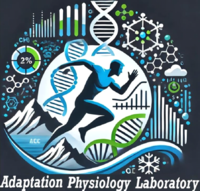Adaptive Physiology Laboratory
Department of Physiology
Faculty of Medicine
ABOUT US

The Laboratory of Adaptive Physiology (LFA) conducts research into the physiological and molecular mechanisms that enable organisms to adapt to changing, often extreme environmental conditions. By integrating practical observations with studies under controlled conditions, we aim to understand how the body adapts to factors such as hypoxia, oxidative stress, environmental toxins or intense exercise.
LFA’s research areas combine basic and translational research, utilizing animal models, cell cultures and human studies. In our research, we employ modern molecular biology techniques, metabolomic and proteomic analysis methods, as well as bioinformatics tools to analyse adaptive processes at the cellular, tissue and systems level.
Our work combines knowledge of applied physiology, ecotoxicology, energy metabolism, immunology and behavioural biology, which enables a holistic approach to the phenomena under study and increases the application potential of the research conducted.
THE MAIN RESEARCH TASK
- Physiological adaptations to environmental stressors or extreme conditions (hypoxia, hyperbaria) in animals or humans
- Physiological responses induced by exercise in a polluted urban environment
- Acute, sub-acute and long-term countermeasures against extreme environmental conditions
- Physiological mechanisms underlying acclimatisation/acclimatisation to extreme environmental conditions: from specific adaptation to transfer and cross-adaptation
- Effects of multiple environmental stressors on physiology and behaviour
- Physiological adaptations to exercise under extreme conditions
- The interaction of environmental and behavioural stressors (e.g. exercise, nutrition) and consequences for physiology and behaviour
- Interaction of behavioural and physiological mechanisms in adaptation
- Using environmental stressors to improve health and performance: mechanisms, benefits and potential risks
- Phenotypic plasticity and physiological susceptibility or tolerance to events extreme.
STRATEGIC OBJECTIVES
- Research – conducting studies on the adaptation of the organism to different environmental conditions.
- International cooperation – establishing partnerships with research institutions and organisations, including sport, and maintaining existing contacts.
- Commercialisation of research – implementation of research results into medical, military practice and sports.
- Technological innovation – developing new technologies to support human performance in harsh environments.
- Education and training – organising courses and workshops for students and professionals in extreme, sports and emergency medicine.
Sources of funding
- Research grants (NCN, NCBR, EU programmes, ESA, non-profit science foundations).
- Cooperation with industry (medical equipment, technical clothing, defence sector, vR technologies).
- Public and private resources
- Commercial projects (training for the military, athletes, space missions).
EXISTING TEAM AND ITS COMPETENCES
- Studies utilizing hypoxicants.
- Programming physical training interventions in a variety of settings.
- Experience with airborne pollutant exposure on humans and animals.
- Analysis of cardiovascular parameters during the study.
- Research in proteomics and metabolomics using mass spectrometry.
- Molecular biology techniques, including transcriptomic studies, using real-time qRT-PCR, droplet digital PCR (ddPCR), PCRꓼ proteomic assays using Western Blotting, ELISAꓼ cytotoxicity and cell proliferation assays (MTT, SRB)ꓼ visualisation of mtDNA replicationꓼ protein overproduction and purification.
- Genetic engineering techniques, molecular cloning, cell transfection eukaryotic (si/esi/shRNA), CRISPR-Cas9.
- Microbiological testing, including tests for bacterial endotoxins (LAL test, turbidimetric method), Salmonella serotyping, antigen production, antibody purification and antibody titres.
- The cultivation of bacteria and cell lines, primary and immortalised, 2D and 3D cultures in vitro.
EXISTING INFRASTRUCUTURE
Cardiac and physiological diagnostics:
- ECG ASPEL Mint
- Wireless 12-channel ECG recorder M-TRACE PC
- Holter pressure
- PhysioFlow Q-Link Impedance Cardiograph
- Central and peripheral blood pressure meter cBP301
- Testing of blood pressure, ECG and saturation parameters using Somnotouch NIBP
- Oximeter Pod ML320 (pulse oximeter)
- Polar heart rate monitors
Exercise testing equipment:
- Kettler TX-5 treadmill
- Cycle ergometers
- Carrying out CPET (Cardiopulmonary Exercise Testing)
- Goniometer MLTS700
- Pulse wave propagation velocity module
Respiratory and metabolic testing equipment:
- SphygmoCor CvMS-CP
- Spirobank II Advanced portable spirometer
- Gas exchange test kit
Neurological and psychophysiological testing equipment:
- EEA under ML317 (eye examination)
- Breathing belt with piezo sensor MLT1132
- Psychophysical testing kit
Analysis of body composition and biochemical parameters:
- ROCHE COBAS Alat Accutrend Plus GCTL (cholesterol, triglycerides, lactate, glucose)
- Tech-med, body fat/hydration monitor
Data processing and analysis equipment:
- Physiological testing system
- Portable thermohygrometer PWT-401
- Data acquisition and processing system ML4856
The Laboratory for Adaptive Physiology (LFA) will be a unique research and development centre that will contribute to the advancement of science and technology, improve safety in extreme environments and enhance education in human physiology. With its interdisciplinary approach and advanced technological facilities, the laboratory will become a key centre supporting the development of physiology, medicine and sport. Cooperation with national and international institutions will enable innovative projects and the implementation of modern diagnostics and therapies.
CONTACT
Magdalena Zabielska-Kaczorowska, Ph.D.
E-mail magdalena.zabielska-kaczorowska@gumed.edu.pl
Phone.: 728 970 749
Adaptive Physiology Laboratory
Department of Physiology
Medical University of Gdańsk
Dębinki 1 St.
80-211 Gdańsk